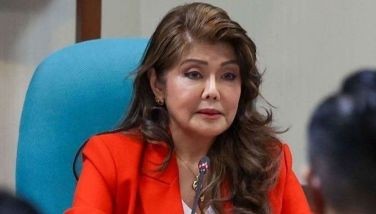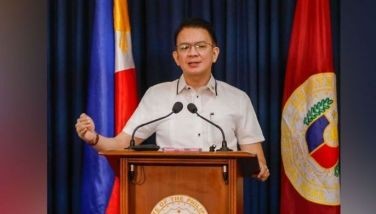DFA downplays threat to Pinoys in Indonesia
August 13, 2002 | 12:00am
Officials of the Department of Foreign Affairs (DFA) downplayed yesterday the security threats to Filipinos in Indonesia due to the detention of a suspected Indonesian terrorist in the country.
Foreign Affairs Secretary Blas Ople and Undersecretary for Policy Lauro Baja Jr. said Filipinos are accorded complete security, especially at the Philippine Embassy in Jakarta, contrary to the claims of Presidential Adviser on Special Concerns Norberto Gonzales.
Gonzales was quoted as saying the Filipinos are in danger of being abducted by militants to pressure the Philippine government to release Agus Dwikarna.
Gonzales disclosed that several groups in Indonesia have threatened to seize Filipinos and hold them in exchange for Dwikarna, who was convicted of illegal possession of explosives in Manila.
"I think these reports are exaggerated. We have made security arrangements with the security organizations in Indonesia, with the police and the military for the complete security of our embassy and the Filipinos in Indonesia," Ople said.
Baja said the Philippines and Indonesia have also yet to negotiate an agreement on transfer of sentenced persons.
"We recommended that even before the Dwikarna case. I don’t know if that can be revived," Baja averred.
He said Indonesian Foreign Minister Nur Hassan Wirajuda explored the idea as an avenue to resolve the issue between the Philippines and Indonesia on Dwikarna.
Gonzales, for his part, said he flew to Indonesia to talk with members of a Muslim extremist group after receiving a tip they were planning to kill Philippine Ambassador Rafael Seguis, torch the embassy and kidnap Filipino expatriates.
"I can’t name the organization right now," he said. "I talked to them directly."
Gonzales said the attacks were planned to avenge the conviction of Dwikarna.
He said he asked the extremists to contact lawyers and fight legally for the extradition of Dwikarna to Indonesia. Gonzales said the Philippine Senate was also contemplating allowing Dwikarna’s extradition. The two countries have no extradition treaty.
He said he also met with some Indonesian politicians and Muslim leaders, including Amien Rais, speaker of Indonesia’s 700-member People’s Consultative Assembly.
"I appealed to all Muslim organizations in Indonesia to respect the justice system of the Philippines and not to resort to (fanaticism)," Gonzales said.
Indonesian Muslims have held street demonstrations in recent weeks to demand Dwikarna’s release.
Gonzales said early contacts with Muslim leaders in Indonesia on the subject started after Dwikarna was arrested but before he was convicted.
Gonzales said the prisoner swap is being considered to pacify restive Indonesian sympathizers of Dwikarna.
Earlier, highly placed sources said Indonesian officials who approached Philippine authorities told them Gonzales had promised a group of Muslim extremists that he would work for the release of Dwikarna.
But Gonzales denied this, saying Dwikarna will not go scot-free even if he is turned over to Indonesian authorities.
The Muslim extremists, the sources said, have been pressuring the Indonesian government to intervene in the case of Dwikarna. The sources said the extremist groups, including Dwikarna’s Indonesian Mujahideen Council and the opposition National Mandate Party (PAN), were expecting their leader’s release following the assurance from Gonzales last June.
During investigation, Dwikarna admitted membership with Jemaah Islamiyah, which is touted as the Southeast Asian wing of Saudi militant Osama bin Laden’s al-Qaeda network. It was said to be responsible for the bombing of the Philippine Embassy in Jakarta in 2000 and the Rizal Day bombing in the same year.
Last July, Dwikarna was sentenced to up to 17 years in prison after a Pasay court found him guilty of carrying C-4 explosives when he was arrested at the Ninoy Aquino International Airport last March.
His two companions were released on orders of President Arroyo upon the intervention of Indonesian President Megawati Sukarnoputri.
Foreign Affairs Secretary Blas Ople and Undersecretary for Policy Lauro Baja Jr. said Filipinos are accorded complete security, especially at the Philippine Embassy in Jakarta, contrary to the claims of Presidential Adviser on Special Concerns Norberto Gonzales.
Gonzales was quoted as saying the Filipinos are in danger of being abducted by militants to pressure the Philippine government to release Agus Dwikarna.
Gonzales disclosed that several groups in Indonesia have threatened to seize Filipinos and hold them in exchange for Dwikarna, who was convicted of illegal possession of explosives in Manila.
"I think these reports are exaggerated. We have made security arrangements with the security organizations in Indonesia, with the police and the military for the complete security of our embassy and the Filipinos in Indonesia," Ople said.
Baja said the Philippines and Indonesia have also yet to negotiate an agreement on transfer of sentenced persons.
"We recommended that even before the Dwikarna case. I don’t know if that can be revived," Baja averred.
He said Indonesian Foreign Minister Nur Hassan Wirajuda explored the idea as an avenue to resolve the issue between the Philippines and Indonesia on Dwikarna.
Gonzales, for his part, said he flew to Indonesia to talk with members of a Muslim extremist group after receiving a tip they were planning to kill Philippine Ambassador Rafael Seguis, torch the embassy and kidnap Filipino expatriates.
"I can’t name the organization right now," he said. "I talked to them directly."
Gonzales said the attacks were planned to avenge the conviction of Dwikarna.
He said he asked the extremists to contact lawyers and fight legally for the extradition of Dwikarna to Indonesia. Gonzales said the Philippine Senate was also contemplating allowing Dwikarna’s extradition. The two countries have no extradition treaty.
He said he also met with some Indonesian politicians and Muslim leaders, including Amien Rais, speaker of Indonesia’s 700-member People’s Consultative Assembly.
"I appealed to all Muslim organizations in Indonesia to respect the justice system of the Philippines and not to resort to (fanaticism)," Gonzales said.
Indonesian Muslims have held street demonstrations in recent weeks to demand Dwikarna’s release.
Gonzales said early contacts with Muslim leaders in Indonesia on the subject started after Dwikarna was arrested but before he was convicted.
Gonzales said the prisoner swap is being considered to pacify restive Indonesian sympathizers of Dwikarna.
Earlier, highly placed sources said Indonesian officials who approached Philippine authorities told them Gonzales had promised a group of Muslim extremists that he would work for the release of Dwikarna.
But Gonzales denied this, saying Dwikarna will not go scot-free even if he is turned over to Indonesian authorities.
The Muslim extremists, the sources said, have been pressuring the Indonesian government to intervene in the case of Dwikarna. The sources said the extremist groups, including Dwikarna’s Indonesian Mujahideen Council and the opposition National Mandate Party (PAN), were expecting their leader’s release following the assurance from Gonzales last June.
During investigation, Dwikarna admitted membership with Jemaah Islamiyah, which is touted as the Southeast Asian wing of Saudi militant Osama bin Laden’s al-Qaeda network. It was said to be responsible for the bombing of the Philippine Embassy in Jakarta in 2000 and the Rizal Day bombing in the same year.
Last July, Dwikarna was sentenced to up to 17 years in prison after a Pasay court found him guilty of carrying C-4 explosives when he was arrested at the Ninoy Aquino International Airport last March.
His two companions were released on orders of President Arroyo upon the intervention of Indonesian President Megawati Sukarnoputri.
BrandSpace Articles
<
>
- Latest
- Trending
Trending
Latest






























